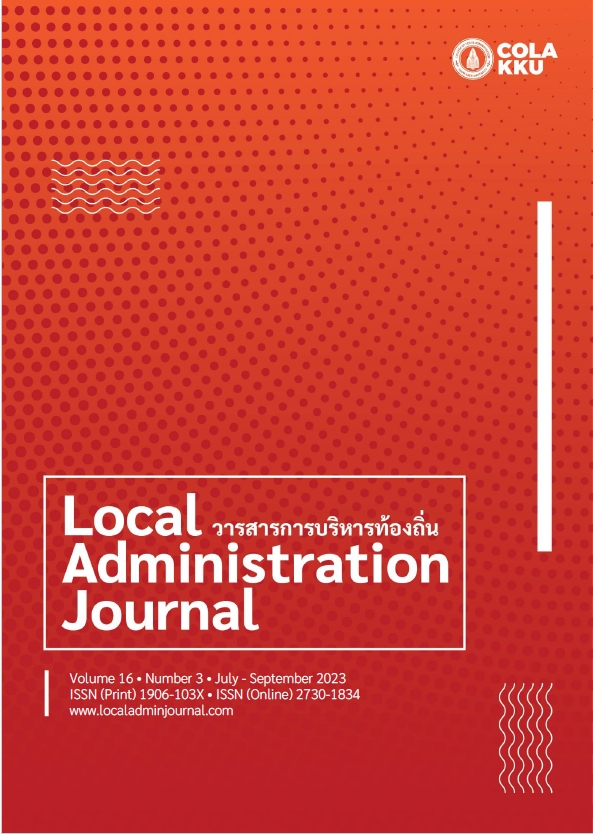Factors Affecting the Success of Sustainable Community Waste Management According to the Circular Economy Principle: A Case Study of Ban Rang Plub Community, Ratchaburi Province
Keywords:
Community Waste Management, Factors Affecting the Success, Circular Economy, Ban Rang Plub CommunityAbstract
This research aimed to analyze sustainable community waste management according to the Circular Economy Principle of Ban Rang Plub Community and to analyze the factors affecting the success of such management. The study was qualitative research. Data were collected through semi-structured interviews with stakeholders in community waste management combined with non-participant observation and documentary research with relevant documents. The researcher has applied the principles of the CIPPIEST Model to analyze data in all 8 aspects including Context, Input, Process, Product, Impact, Effectiveness, Sustainability, and Transportability. The results showed that factors affecting the success of sustainable community waste management according to the Circular Economy Principle of Ban Rang Plub Community were: 1) The community’s leaders were strong, 2) The community has obtained support from external network partners, 3) The community has clearly defined agreements and processes for community waste management, 4) The community members cooperate, and 5) The community has transferred knowledge to new generations and other communities. These results can be adapted to be used as a guideline for the development or improvement of community waste management in other communities to operate efficiently leading to success in sustainable community waste management in the future.
References
ภาษาไทย
SCG Circular Way. (2562). เศรษฐกิจหมุนเวียน. สืบค้นเมื่อ 5 เมษายน 2566, จาก https://www.scg.com/sustainability/circulareconomy/interesting/circulareconomy-is-new-chance/
กรมควบคุมมลพิษ. (2564). รายงานสถานการณ์มลพิษของประเทศไทย ปี 2563 (Thailand State of Pollution Report 2020). กรุงเทพฯ: บริษัท สไตล์ครีเอทีฟเฮ้าส์ จำกัด.
กรมส่งเสริมคุณภาพสิ่งแวดล้อม. (2562). ประกาศผลโครงการชุมชนปลอดขยะ (Zero Wasteประจำปี 2562. สืบค้นเมื่อ 27 มีนาคม 2566, จาก https://www.facebook.com/permalink.php?id=325267034266472&story_fbid=2494858907307263
กิตติ มีศิริ. (2559). การศึกษาเรื่องปัจจัยแห่งความสำเร็จในการจัดการขยะมูลฝอยโดยชุมชน กรณีศึกษาชุมชนเกตุไพเราะ 3, 4, 5 เขตพระโขนง กรุงเทพมหานคร. รายงานการค้นคว้าอิสระปริญญารัฐศาสตรมหาบัณฑิต สาขาบริหารรัฐกิจและ กิจการสาธารณ, มหาวิทยาลัยธรรมศาสตร์.
จำลอง โพธิ์บุญ. (2554). การบริหารโครงการสิ่งแวดล้อม (พิมพ์ครั้งที่ 4). กรุงเทพฯ: ทิพย์เนตรการพิมพ์.
ชนะชน ปุราชะกัง. (2562). ปัจจัยที่ส่งผลต่อความสำเร็จในการพัฒนาชุมชนอย่างยั่งยืนตามหลักปรัชญาเศรษฐกิจพอเพียง กรณีศึกษา ชุมชนเกาะกก จังหวัดระยอง. รายงานการค้นคว้าอิสระปริญญาวิทยาศาสตรมหาบัณฑิต สาขาการจัดการสิ่งแวดล้อม, สถาบันบัณฑิตพัฒนบริหารศาสตร์.
ชุมชนบ้านรางพลับ. (2561). ข้อมูลพื้นฐานของชุมชนบ้านรางพลับ. สืบค้นเมื่อ 3 เมษายน 2566, จาก https://drive.google.com/file/d/1VHGaVrknzSQ2E6Yz8m_4hXRp6WPY0dU8/view?usp=sharing
ทีปทัศน์ ชินตาปัญญากุล, สมจิตรา เรืองศรี, กิตติศักดิ์ ลักษณา และพรภิรมย์ หลงทรัพย์. (2560). การประเมินหลักสูตรแนวใหม่: รูปแบบ CIPPIEST. วารสารพยาบาลตำรวจ, 9(2), 208-210.
ธนภัทร เพชราเวช. (2560). การศึกษาปัจจัยความสำเร็จในการบริหารจัดการขยะมูลฝอยชุมชน กรณีศึกษาชุมชนพบสุข ตำบลบางตลาด เทศบาลนครปากเกร็ด. รายงานการค้นคว้าอิสระปริญญาวิทยาศาสตรมหาบัณฑิต สาขาการจัดการสิ่งแวดล้อม, สถาบันบัณฑิตพัฒนบริหารศาสตร์.
ลักษมี เกตุสกุล. (2558). การมีส่วนร่วมของประชาชนในการจัดการสิ่งแวดล้อม: กรณีศึกษา ชุมชนบ้านทุ่งศรี อำเภอร้องกวาง จังหวัดแพร่. วิทยานิพนธ์ปริญญาวิทยาศาสตรมหาบัณฑิต สาขาการจัดการสิ่งแวดล้อม, สถาบันบัณฑิตพัฒนบริหารศาสตร์.
Translated References
Ban Rang Plub Community. (2018). Basic Information of Ban Rang Plub Community. Retrieved April 3, 2023, from https://drive.google.com/file/d/1VHGaVrknzSQ2E6Yz8m_4hXRp6WPY0dU8/view?usp=sharing. (In Thai)
Chintapanyakun, T., Ruaengsri, S., Laksana, K. & Lhongsap, P. (2017). The New Curriculum Evaluation: CIPPIEST Model. Journal of the Police Nurses, 9(2), 208-210. (In Thai)
Department of Environmental Quality Promotion (DEQP). (2019). Announcement of Zero Waste Community Project in 2019. Retrieved March 27, 2023, from https://www.facebook.com/permalink.phpid=325267034266472&story_fbid=249485890730263. (In Thai)
Ketsakul, L. (2015). Public Participation in Environmental Management: A Case Study of Banthungsri Community Rongkwang, Phrae Province, Thailand. Master thesis for Master Degree of Science in Environmental Management, National Institute of Developmental Administration. (In Thai)
Meesiri, K. (2016). Key Success Factors of Community Based Solid Waste Management: A Case Study of Ket Piroh Community 3, 4, 5 Phrakanong District Bangkok Metropolitan. Independent Study Report for Master Degree of Political Science in Public Administration and Public Affairs, Thammasat University. (In Thai)
Phetcharawet, T. (2017). The Success of Community’s Waste Management: Case Study Pobsook Community, Bangtalad Sub-district, Pakkret Municipality, Nonthaburi Province. Independent Study Report for Master Degree of Science in Environmental Management, National Institute of Developmental Administration. (In Thai)
Poboon, C. (2011). Environmental Project Management (4th ed.). Bangkok: ThipNet Kan Phim.
Pollution Control Department. (2021). Thailand State of Pollution Report 2020. Bangkok: Style Creative House Co., Ltd. (In Thai)
Purachakung, C. (2019). Factors Affect to the Success of Sustainable Community Development According to Sufficiency Economy Philosophy: The Case Study of Ko Kok Community, Rayong Province, Thailand. Independent Study Report for Master Degree of Science in Environmental Management, National Institute of Developmental Administration. (In Thai)
SCG Circular Way. (2019). Circular Economy. Retrieved April 5, 2023, from https://www.scg.com/sustainability/circulareconomy/ interesting/circulareconomy-is-newchance/. (In Thai)
Thailand Business Council for Sustainable Development (TBCSD). (2019). TBCSD Sustainable Development. Nonthaburi: Author. (In Thai)
Downloads
Published
How to Cite
Issue
Section
License
Copyright (c) 2023 Local Administration Journal

This work is licensed under a Creative Commons Attribution-NonCommercial-NoDerivatives 4.0 International License.
The copyright of all articles published in the Local Administration Journalis owned by the College of Local Administration, Khon Kaen University.



